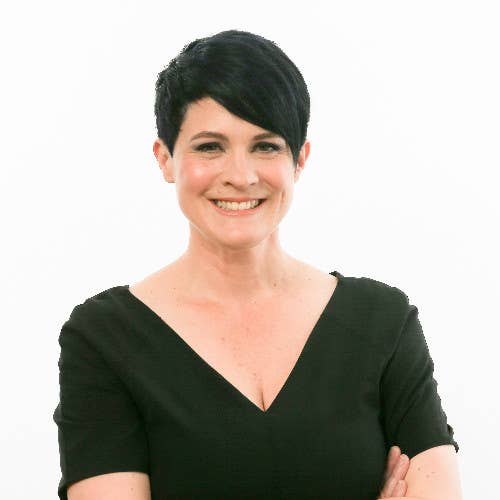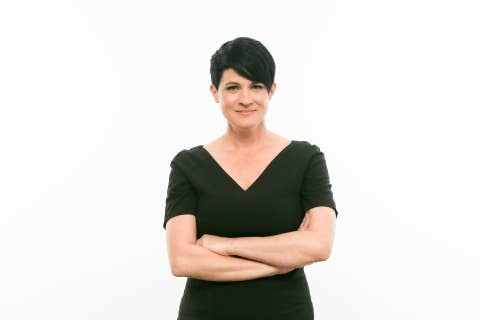Pole to Win CEO: Building a team that will retire with you
Deborah Kirkham on the importance of company culture, and how she landed her current executive role by asking for it
Looking at Deborah Kirkham's path to the role of CEO at Pole to Win, there's a clear recurring theme: her promotions tend to come on the heels of bold decisions.
Kirkham first joined the industry in 2002, and for eight years worked in various leadership positions across three different publishers. Venturing into product services hadn't initially been part of the plan, but a door opened in an unusual way in 2010. When a deal between Kirkham's then-current employer and her future employer didn't work out, Kirkham was asked for an explanation. And what she said in reply was so compelling, she was offered a job.
That job later turned into Kirkham's position as COO of Pole to Win, then president and COO, and now most recently CEO and board member of parent company Poletowin Pitcrew Holdings. Though Kirkham's been in an executive role with the company for nine years now, her ultimate rise to the top position in the company also came about in a bold way.
"I was in the same role for years," she says. "I was at a conference and we had a breakout session, and we had a mentor and we were talking about [what the next step was for each of us]. and how to get there. And I started thinking, 'Oh my gosh, I should be the CEO of the company!'
"I started thinking, 'Oh my gosh, I should be the CEO of the company!'"
"I hadn't asked for it. A lot of women have - I don't want to make any assumptions about other women - but you've heard of imposter syndrome, right? That's what I have! Every year I'd look at how we'd grown. Double-digit growth. Adding new lines of business. I'd accomplished great things. Not alone, with the rest of my team, and yet every year I'd say, 'If we grow by X percent next year, maybe I'll ask for the promotion. Maybe when we get this number, I'll ask for that promotion.' And I never did.
"So I made the decision at that breakout session that I was going to ask for it, and I did. And the answer was yes."
Kirkham is one of relatively few women in a C-level position in the gaming industry, and says her accomplishments have come with their share of challenges. She tells me she once worked for a company of 200 where she was the only woman, and has sat in meetings where she was "the only woman in a room of 14 suits."

Now in a position to affect those kinds of situations, Kirkham says that companies need to value diversity, and not stop with gender diversity.
"I've learned over the years that the best meetings are filled with people who are not like you," she says. "Hire the best people, the most talented, the brightest people. It doesn't matter if they're male or female, it doesn't matter what race they are. Just hire good people, cultivate them, train them, help them grow."
I ask Kirkham how she felt about the oft-discussed notion of implicit hiring biases in the tech industry that may need to be combatted with specific efforts to hire diverse individuals.
"I don't want to get into gender bias," she replies. "It's a big beautiful industry, and we have a long ways to go, but I guess I'm just fortunate to work for a company where that doesn't come into play."
Kirkham has held leadership roles at Pole to Win over a period of steady growth for the company, which has seen it open new offices, expand into new regions, and add new lines of business. She's naturally pleased with the growth of the company as a whole, but is especially proud of the longevity of her executive team in an industry notorious for turnover and burnout. She says that tenacity is a direct result of a strong company culture.
"In the tech industry, people will work long hours. So do we, sometimes, but it's not something that is considered to be okay"
"I have 11 reports spread across five countries on three continents," she says. "And they have an average tenure with the company of nearly nine years. In Silicon Valley, the average tenure is only two. Why is that? How do you build a team that will retire with you?"
"It's all about connection. Human, face-to-face connection. Culture starts at the top. I own it. And our culture is really rooted on the belief that we're a family. I don't tolerate politics of any kind, so people are more willing to try new things and make mistakes. And we've built an environment where people are able to grow and flourish without having to look behind their back. We put family first. In the tech industry, people will work long hours. So do we, sometimes, but it's not something that is considered to be okay in our company."
Kirkham returns multiple times to what she refers to as a "family first" company culture at Pole to Win. She offers one particular example of how this culture specifically benefitted her in a situation that otherwise would have forced her to make a difficult career choice.
"I've been at the company for nearly nine years; I spent half of that time on the road. But I also have a daughter, she's five, and she has special needs. And it got very difficult to keep leaving her behind. I got to the point where I sat down with my boss and said that something had to change...And so now, everywhere I go, anywhere in the world, she comes with me."
Twice in our conversation, Kirkham mentions that she doesn't "tolerate politics of any kind" at Pole to Win. Given especially that the company is a global one with 16 offices in ten different countries, I ask her if this philosophy had ever run into conflict with issues of human or civil rights, or issues that directly impacted her employees' lives.
"We care about our employees and certainly cultures are different all over the world, but the company culture is the thing," she says. "We're very protective of our culture during the hiring process...which is why we're six months behind on our sales hirings! But I'm more interested in hiring good people - bright, smart, talented - that fit our company culture, than anything else. And if it takes time, it takes time."
"Many developers and publishers don't think about testing until it's almost too late"
Kirkham's hiring-focused response seemed an odd one given the question. Following the interview, I reached back out to ask Kirkham specifically what she meant by "politics" given the seeming discrepancy between my question and her response. Kirkham elaborated that she was referencing the "lack of a team environment," and that Pole to Win is not a place where employees "backstab or manipulate one another."
Another important element in creating Pole to Win's culture that Kirkham mentioned was that it "is not considered to be okay" to work long hours. As a product services company, Pole to Win isn't directly developing games. But one of the services it offers is QA, a field that has seen numerous reports across multiple studios over the last few years of being notorious for heavy crunch. But Kirkham says that Pole to Win's size (2,000 employees) and reach gives them the ability to avoid it with a combination of careful planning, and allocating work to as many people as are needed.
"In the games industry, many developers and publishers don't think about testing until it's almost too late," she says. "But we have enough talent that we can meet demand. We understand crunch, we understand release dates, but we can meet those demands without overworking our own people.
"Certainly there are times when our employees work overtime, but we prefer to go into shift work and manage it in other ways. We do have studios all over the world, so there have been times we've been able to access talent in multiple locations so we can help the client meet their deadline without working our people around the clock."
Aside from QA, Pole to Win's offerings include customer service, localization, audio production, and engineering services. Kirkham anticipates the company will continue to add both new studios and new lines of business in the coming years, and says it's investing heavily in R&D with a particular eye to what's happening with mobile, streaming, and cross-platform play.
"We expect the mobile market to continue to grow, and also you'll see a lot more genres on mobile because technology is going to enable that shift," she says. "And more and more, companies are looking to launch their games outside of domestic markets, and are developing their games to appeal to a wider audience. If you look at online game streaming like Netflix, we're not there yet, but we will be. And certainly technology platforms that enable cross-platform play will have more games played by more owners regardless of gaming device. There are a lot of very exciting things happening."
For the record: This article has been updated with Kirkham's response on the question of what she meant by "politics" in her responses.

